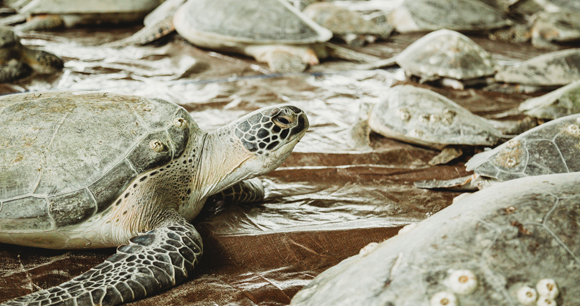February saw a rare winter storm hit southern US states, including an unprecedented blackout that caused multiple human and animal deaths. In Texas, the storm affected natural gas plants and pipelines, nuclear power facilities, coal-fired power stations, and wind turbines. In a state unused to (and grossly unprepared for) such extreme and persistent cold weather, the result was widespread power outages, burst pipelines, and water shortages.

On top of the infrastructure and human casualties, the prolonged period of subfreezing temperatures combined with a reduction in food supplies affected several wild and domestic species, including large numbers of bats found perished in tunnels, hundreds of dead fish washed up on shores, pets left outside during the bitter cold, and imported non-native animals accustomed to warmer temperatures succumbing to the cold. Countless farm animals died: One Texas company reported the loss of over 1 million chickens.
Approximately 4,500 green sea turtles, stunned by the cold, washed up on South Padre Island at the southeastern tip of Texas. A local nonprofit group, Sea Turtle, Inc., stepped in to coordinate the rescue effort, with support from AWI and others. Volunteers carefully gathered the turtles and transported them to the Island Convention Center, which had been organized and equipped as an emergency rescue center. There, the animals were allowed to warm up and rehabilitate before being released back into the Gulf of Mexico.
Less fortunate were some of the primates and other animals at a sanctuary outside San Antonio. The facility, which houses over 300 rescue animals, lost power for four days, resulting in the deaths of several inhabitants, including a chimpanzee, monkeys, lemurs, and birds.
Spurred on by climate change, severe weather events—dubbed by one National Geographic writer as “man-made natural disasters”—are becoming more common (and more severe) throughout the world. Acknowledging this, we must anticipate and become better prepared for such events in the future. Better yet, we must curb activities that contribute to them in the first place.